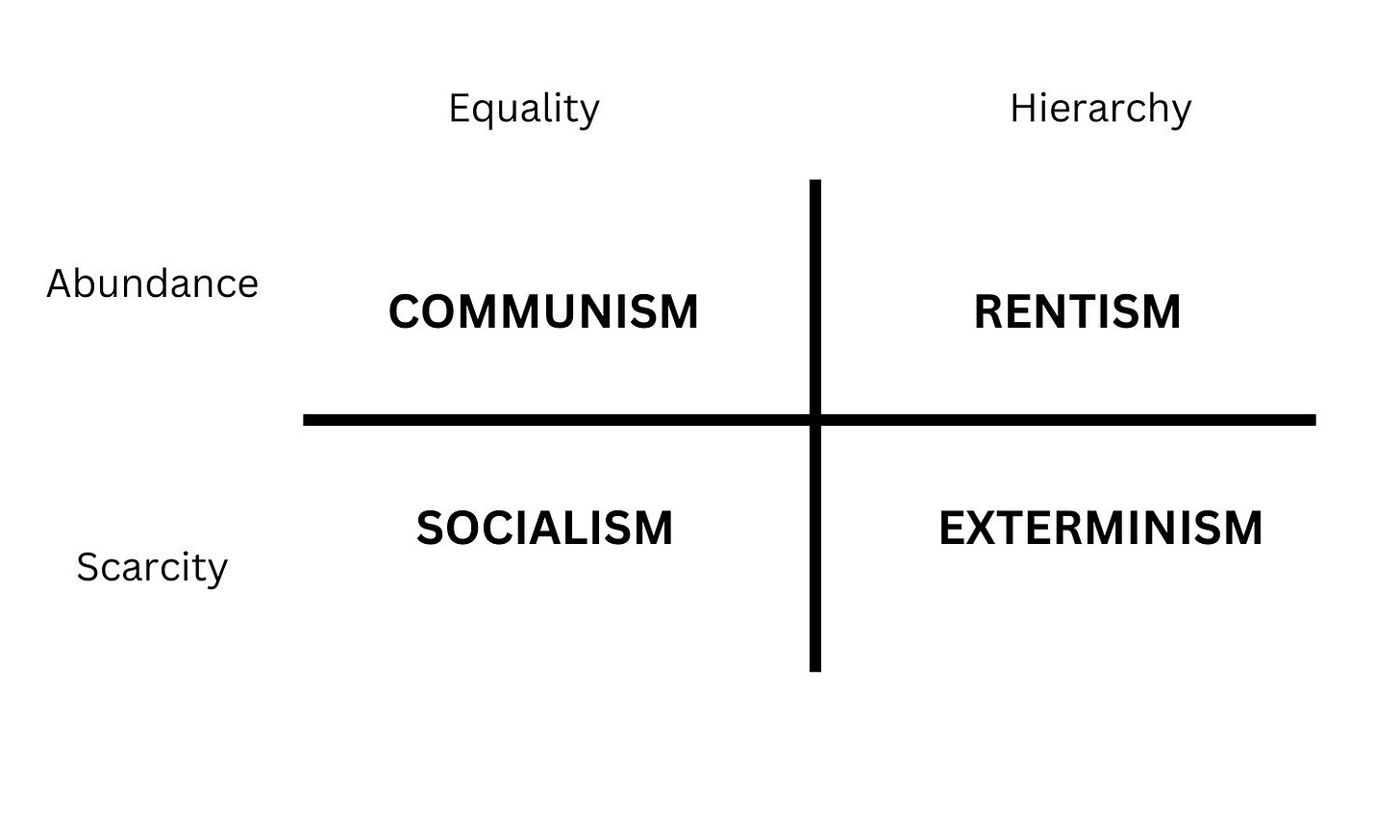Four Futures Abridged
a book report on Peter Frase's potential futures
I’m interested in the future, so Peter Frase’s 2016 book Four Futures has been recommended to me a few times. The first time it came on my radar was in conversation with an anarcho-primitivist at the Boston Art Book Fair a few months ago, and a new friend loaned me their copy after reading my zine A Future.
I was expecting the book to be pretty different than what I got. I thought that the futures described would be day-in-the-life experiences in the different scenarios of the future, or world building exercises. But instead, Frase presents four possible futures that could result from political prioritization in the face of two different pressures: climate change and automation. He outlines different social engines and how they’re already at play in the current moment, and extrapolates from there to consider strategic next steps for organizing.
The consideration of climate change creates the axis abundance - scarcity. The consideration of automation and class relations creates the axis equality - hierarchy. Frase also assumes that in these futures, all labor related to material production is automated. With these two axes, he creates four potential futures:
COMMUNISM - Abundance and Equality
Universal Basic Income is introduced and gradually replaces wage labor in providing for people’s basic needs. Work then centers on the labor that makes people feel the most fulfilled - more like a quest than a job. People are able to do the work that they want to do to define themselves and their communities.
Even though communism is the future of Equality over Hierarchy, Hierarchy as a concept isn’t totally evaporated. There are still ladders to climb. But the current dominant hierarchy of WEALTH, and the identity politic hierarchies that organize people by their relationship to the dominant hierarchy, is decentralized/made irrelevant. Other hierarchies emerge.
RENTISM - Abundance and Hierarchy
Access to the means of production is still controlled by a tiny class of elites who control the vectors of information. The economy shifts away from one focused on material production of commodities to one focused on the generation and litigation of intellectual property.
Frase describes the process of ENCLOSURE, which happened when land went from being a public good to being privately controlled by a ruling class. The same thing is effectively happening with intellectual property and patterns.
As the chapter concludes, Frase points out that in this scenario, it would be difficult to create enough jobs for people to sustain a working class. Eventually something would have to give. Theoretically, it’s really hard to justify a world where automation has made labor unnecessary but a class hierarchy is maintained.
SOCIALISM - Scarcity and Equality
Humans need to reorganize their society to be more in line with the natural environment that we currently occupy, owning our place in the ecosystem.
Cooperation in the face of scarcity would require a ton of political organization and very likely a planned economy.
This future would take a lot of political will power but ultimately is probably the one that I got the most attached to. This chapter has lots of references to the work of Kim Stanley Robinson, who I’ve not read before!
EXTERMINISM - Scarcity and Hierarchy
Technologies are developed to survive the worst of the climate crisis, but they’re only available to the wealthy. The only employment left for the working class is to police the other members of their class and protect the comfort of the wealthy. Policing becomes more and more intense. A class genocide is possible/likely as a work force is no longer needed to sustain the comfort of the elites.
This section was pretty difficult to read!
When I talk about this book with folks, I’ll describe the premises of each of the futures and they’ll say something about which one they want to come to fruition. They’re like, “Oh, I want it to be that one!” Which I think is an interesting impulse! The thesis of the book is definitely that none of these futures are going to “just happen.” They will come as the result of setting political priorities and acting on those priorities.
The section that made me think the most was definitely the chapter on Socialism - there’s something about a utopia that is founded on collaborative community making and needing to do a lot of work to maintain life is attractive to me as an anarchist-leaning person. But the chapter on Socialism also sent me into a thought spiral thinking about how we would organize economically if we didn’t use a market. This quote stuck out to me a lot:
"There are some socialists who see the market as inherently incompatible with a desirable post-capitalism... Because markets use money and commodities to mediate our relations with one another, this line of argument goes, they are inherently less sociable and human than some other ways of organizing our economic life, such as engaging in barter, self-sufficiently providing for our needs in a commune, or implementing a fully planned economy in which all enterprise is socialized and decisions about production and distribution are made through a political process." - (111-112)
Yeah I think the thing that was most challenging about these options was because it was so hard for me to answer the question that everyone always tries to answer when Four Futures comes up - what do I want to have happen? It’s been a really good prompt for me to pick up a few other books I want to read and start thinking more in depth about what futures I want to work towards.
Definitely a lot of interesting food for thought in this book and I recommend especially reading it with friends!

